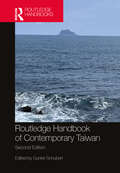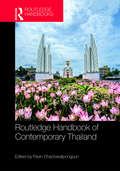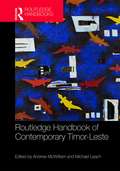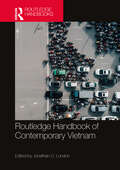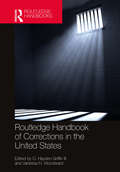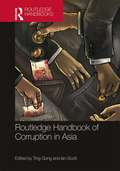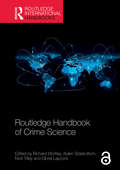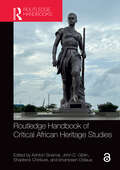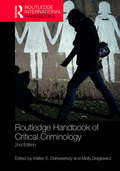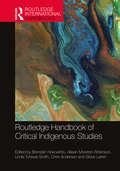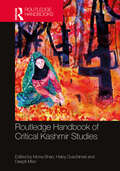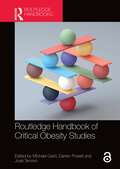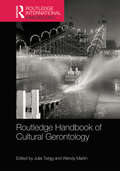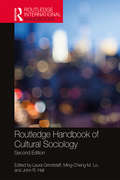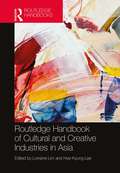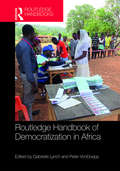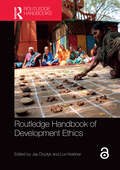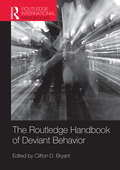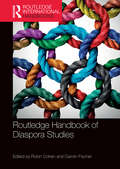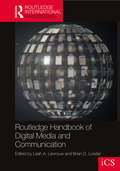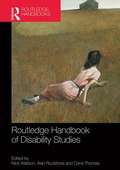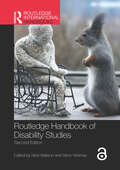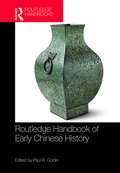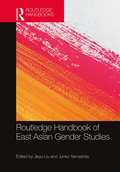- Table View
- List View
Routledge Handbook of Contemporary Taiwan
by Gunter SchubertThis fully revised 2nd edition of the Routledge Handbook of Contemporary Taiwan provides a comprehensive overview of both contemporary Taiwan and the Taiwan studies field.Written by an international team of Taiwan experts, the Handbook includes major topics in Taiwanese history, domestic politics, political economy, society, culture, and international relations. Each chapter summarises the major findings in the field and highlights long-term trends, recent observations, and potential future developments in Taiwan, revealing its long journey from a frontier island to a highly industrialised country struggling for international recognition.Up-to-date, interdisciplinary, and academically rigorous, the Handbook offers the reader an accessible and fascinating insight into contemporary Taiwan and will be of interest to students, academics, and policymakers with an interest in all things Taiwan.
Routledge Handbook of Contemporary Thailand
by Pavin ChachavalpongpunThe Routledge Handbook of Contemporary Thailand is a timely survey and assessment of the state of contemporary Thailand. While Thailand has changed much in the past decades, this handbook proposes that many of its problems have remained intact or even persistent, particularly problems related to domestic politics. It underlines emerging issues at this critical juncture in the kingdom and focuses on the history, politics, economy, society, culture, religion and international relations of the country. A multidisciplinary approach, with chapters written by experts on Thailand, this handbook is divided into the following sections. History Political and economic landscape Social development International relations Designed for academics, students, libraries, policymakers and general readers in the field of Asian studies, political science, economics and sociology, this invaluable reference work provides an up-to-date account of Thailand and initiates new discussion for future research activities.
Routledge Handbook of Contemporary Timor-Leste
by Michael Leach Andrew McWilliamReflecting on the legacies of Timor-Leste's remarkable journey from colonialism to sovereign and democratic Independence, the Routledge Handbook of Contemporary Timor-Leste provides a comprehensive and up-to-date reference work on all aspects of life in Timor-Leste. Following an introduction and overview of the country, the Handbook is divided into five parts: Politics and governance Economics and development Social policies and the terms of inclusion Cultural impacts Regional relations Written by an international team of experts, the Handbook covers the principle concerns that have contributed significantly to the shape and character of contemporary Timor-Leste. It offers a timely and valuable reference guide for students, scholars and policymakers with an interest in International Relations, Southeast Asian Studies and Peace Studies.
Routledge Handbook of Contemporary Vietnam
by Jonathan D. LondonThe Routledge Handbook of Contemporary Vietnam is a comprehensive resource exploring social, political, economic, and cultural aspects of Vietnam, one of contemporary Asia’s most dynamic but least understood countries. Following an introduction that highlights major changes that have unfolded in Vietnam over the past three decades, the volume is organized into four thematic parts: •Politics and Society•Economy and Society•Social Life and Institutions•Cultures in Motion Part I addresses key aspects of Vietnam’s politics, from the role of the Communist Party of Vietnam in shaping the country’s institutional evolution, to continuity and change in patterns of socio-political organization, political expression, state repression, diplomatic relations, and human rights. Part II assesses the transformation of Vietnam’s economy, addressing patterns of economic growth, investment and trade, the role of the state in the economy, and other economic aspects of social life. Parts III and IV examine developments across a variety of social and cultural fields through chapters on themes including welfare, inequality, social policy, urbanization, the environment and society, gender, ethnicity, the family, cuisine, art, mass media, and the politics of remembrance. Featuring 38 essays by leading Vietnam scholars from around the world, this book provides a cutting-edge analysis of Vietnam’s transformation and changing engagement with the world. It is an invaluable interdisciplinary reference work that will be of interest to students and academics of Southeast Asian studies, as well as policymakers, analysts, and anyone wishing to learn more about contemporary Vietnam.
Routledge Handbook of Corrections in the United States (Routledge International Handbooks)
by O. Hayden Griffin III and Vanessa H. WoodwardThe Routledge Handbook of Corrections in the United States brings together original contributions from leading scholars in criminology and criminal justice that provide an in-depth, state-of-the-art look at the most important topics in corrections. The book discusses the foundations of corrections in the United States, philosophical issues that have guided historical movements in corrections, different types of punishment and supervision, trends in incarceration, issues affecting race, ethnicity, and special populations in corrections, and a variety of other emerging issues. This book scrutinizes innovative community programs as well as more traditional sanctions, and exposes the key issues and debates surrounding the correctional process in the United States. Among other important topics, selections address the inherent discrimination within the system, special issues surrounding certain populations, and the utilization of the death penalty as the ultimate punishment. This book serves as an essential reference for academicians and practitioners working in corrections and related agencies, as well as for students taking courses in criminal justice, criminology, and related subjects.
Routledge Handbook of Corruption in Asia
by Ian Scott Ting GongCorruption in Asia ranges from the venal rent-seeking of local officials to the million-dollar bribes received by corrupt politicians; from excessive position-related consumption to future job offers in the private sector for compliant public servants; from money-laundering to ‘white elephant’ projects that do little more than line the pockets of developers and their political partners. The Routledge Handbook of Corruption in Asia addresses the theories, issues and trends in corruption and anticorruption reform that have emerged from this diverse experience. The book is divided into four major parts: corruption and the state; corruption and economic development; corruption and society; and controlling corruption: strategies, successes and failures. Chapters compare and contrast corruption in different social and institutional contexts, examine both successful and unsuccessful attempts to control it, and consider what lessons can be drawn from these Asian experiences. This academically rigorous and insightful book will be of interest to a wide range of students and scholars, particularly those of Asian studies, politics and sociology.
Routledge Handbook of Crime Science (Routledge International Handbooks)
by Richard Wortley Nick Tilley Aiden Sidebottom Gloria LaycockCrime science is precisely what it says it is: the application of science to the phenomenon of crime. This handbook, intended as a crime science manifesto, showcases the scope of the crime science field and provides the reader with an understanding of the assumptions, aspirations and methods of crime science, as well as the variety of topics that fall within its purview. Crime science provides a distinctive approach to understanding and dealing with crime: one that is outcome-oriented, evidence-based and that crosses boundaries between disciplines. The central mission of crime science is to find new ways to cut crime and increase security. Beginning by setting out the case for crime science, the editors examine the roots of crime science in environmental criminology and describe its key features. The book is then divided into two sections. The first section comprises chapters by disciplinary specialists about the contributions their sciences can make or have already made to crime science. The second section of the book comprises a series of exemplary case studies in crime science, showing a wide range of the kind of work that crime scientists do. The editors conclude by drawing on the preceding contributions, as well as germane areas of research, to offer a thoughtful consideration of future directions for crime science. This book is essential reading for social scientists and scientists alike and marks a new phase in the study of crime and its detection and prevention.
Routledge Handbook of Critical African Heritage Studies
by Shadreck Chirikure Ashton Sinamai John D. Giblin Ishanlosen OdiauaThis handbook is a foundational reference point for critical heritage research about Africa and its diaspora.Foregrounding the diversity of knowledge systems needed to examine heritage issues in such a diverse continent, the contributors to this volume: argue for an understanding heritage that is at once both natural and cultural, tangible and intangible, political and dissonant, going beyond the physical and objective to include subjective narratives, performances, rituals, memories and emotions examine the pre-coloniality, coloniality, post-coloniality, and decoloniality of current African heritage discourses and their consequences analyse how heritage legislation derived from colonial law is compatible or otherwise with how heritage is perceived, identified and remembered in African communities discuss questions of repatriation, restitution and reparations in relation to the return of artefacts from Western countries illuminate the importance of ‘difficult heritage’ within Africa and its diaspora consider the role of heritage for development in Africa Making a crucial contribution to our understanding of African conceptions and practices of heritage, this book is an important read for scholars of African Studies, heritage and museum studies, archaeology, anthropology and history.
Routledge Handbook of Critical Criminology: 2nd edition (Routledge International Handbooks)
by Walter S. Dekeseredy Molly DragiewiczThe main objective of the second edition of the Routledge Handbook of Critical Criminology is twofold: (1) to provide original chapters that cover contemporary critical criminological theoretical offerings generated over the past five years and (2) to provide chapters on important new substantive topics that are currently being studied and theorized by progressive criminologists. Special attention is devoted to new theoretical directions in the field, such as southern criminology, queer criminology, and green criminology. The diverse chapters cover not only cutting-edge theories, but also the variety of research methods used by leading scholars in the field and the rich data generated by their rigorous empirical work. In addition, some of the chapters suggest innovative and realistic short- and long-term policy proposals that are typically ignored by mainstream criminology. These progressive strategies address some of the most pressing social problems facing contemporary society today, which generate much pain and suffering for socially and economically disenfranchised people. The new edition of the Handbook is a major work in redefining areas within the context of international multidisciplinary critical research, and in highlighting emerging areas, such as human trafficking, Internet pornography and image-based sexual abuse. It is specifically designed to be a comprehensive resource for undergraduate and postgraduate students, researchers and policymakers.
Routledge Handbook of Critical Indigenous Studies (Routledge International Handbooks)
by Brendan Hokowhitu, Aileen Moreton-Robinson, Linda Tuhiwai-Smith, Chris Andersen and Steve LarkinThe Routledge Handbook of Critical Indigenous Studies is the first comprehensive overview of the rapidly expanding field of Indigenous scholarship. The book is ambitious in scope, ranging across disciplines and national boundaries, with particular reference to the lived conditions of Indigenous peoples in the first world. The contributors are all themselves Indigenous scholars who provide critical understandings of indigeneity in relation to ontology (ways of being), epistemology (ways of knowing), and axiology (ways of doing) with a view to providing insights into how Indigenous peoples and communities engage and examine the worlds in which they are immersed. Sections include: • Indigenous Sovereignty • Indigeneity in the 21st Century • Indigenous Epistemologies • The Field of Indigenous Studies • Global Indigeneity This handbook contributes to the re-centring of Indigenous knowledges, providing material and ideational analyses of social, political, and cultural institutions and critiquing and considering how Indigenous peoples situate themselves within, outside, and in relation to dominant discourses, dominant postcolonial cultures and prevailing Western thought. This book will be of interest to scholars with an interest in Indigenous peoples across Literature, History, Sociology, Critical Geographies, Philosophy, Cultural Studies, Postcolonial Studies, Native Studies, Māori Studies, Hawaiian Studies, Native American Studies, Indigenous Studies, Race Studies, Queer Studies, Politics, Law, and Feminism.
Routledge Handbook of Critical Kashmir Studies
by Deepti Misri Mona Bhan Haley DuschinskiThe Routledge Handbook of Critical Kashmir Studies presents emerging critical knowledge frameworks and perspectives that foreground situated histories and resistance practices to challenge colonial and postcolonial forms of governance and state building. It politicizes discourses of nationalism, patriotism, democracy, and liberalism, and it questions how these dominant globalist imaginaries and discourses serve institutionalized power, create hegemony, and normalize domination. In doing so, the handbook situates Critical Kashmir Studies scholarship within global scholarly conversations on nationalism, sovereignty, indigenous movements, human rights, and international law. The handbook is organized into the following five parts: • Territories, Homelands, Borders • Militarism, Humanism, Occupation • Memories, Futures, Imaginations • Religion, History, Politics • Armed Conflict, Global War, Transnational Solidarities A comprehensive reference work documenting and consolidating the growing Critical Kashmir Studies scholarship, this handbook will be of interest to scholars of anthropology, political science, cultural studies, legal and sociolegal studies, sociology, history, critical Indigenous studies, settler colonial studies, and feminist studies.
Routledge Handbook of Critical Obesity Studies
by Michael GardThe Routledge Handbook of Critical Obesity Studies is an authoritative and challenging guide to the breadth and depth of critical thinking and theory on obesity. Rather than focusing on obesity as a public health crisis to be solved, this reference work offers divergent and radical strategies alongside biomedical and positivist discourses. Comprised of thirty nine original chapters from internationally recognised academics, as well as emerging scholars, the Handbook engages students, academics, researchers and practitioners in contemporary critical scholarship on obesity; encourages engagement of social science and related disciplines in critical thinking and theorising on obesity; enhances critical theoretical and methodological work in the area, highlighting potential gaps as well as strengths; relates critical scholarship to new and evolving areas of obesity-related practices, policies and research. This multidisciplinary and international collection is designed for a broad audience of academics, researchers, students and practitioners within the social and health sciences, including sociology, obesity science, public health, medicine, sports studies, fat studies, psychology, nutrition science, education and disability studies.
Routledge Handbook of Cultural Gerontology (Routledge International Handbooks)
by Wendy Martin Julia TwiggLater years are changing under the impact of demographic, social and cultural shifts. No longer confined to the sphere of social welfare, they are now studied within a wider cultural framework that encompasses new experiences and new modes of being. Drawing on influences from the arts and humanities, and deploying diverse methodologies – visual, literary, spatial – and theoretical perspectives Cultural Gerontology has brought new aspects of later life into view. This major new publication draws together these currents including: Theory and Methods; Embodiment; Identities and Social Relationships; Consumption and Leisure; and Time and Space. Based on specially commissioned chapters by leading international authors, the Routledge Handbook of Cultural Gerontology will provide concise authoritative reviews of the key debates and themes shaping this exciting new field.
Routledge Handbook of Cultural Sociology: 2nd Edition (Routledge International Handbooks)
by John R. Hall Laura Grindstaff Ming-Cheng M. LoThe thoroughly revised and updated second edition of the Routledge Handbook of Cultural Sociology provides an unparalleled overview of sociological and related scholarship on the complex relations of culture to social structures and everyday life. With 70 essays written by scholars from around the world, the book brings diverse approaches into dialogue, charting new pathways for understanding culture in our global era. Short, accessible chapters by contributing authors address classic questions, emergent issues, and new scholarship on topics ranging from cultural and social theory to politics and the state, social stratification, identity, community, aesthetics, and social and cultural movements. In addition, contributors explore developments central to the constitution and reproduction of culture, such as power, technology, and the organization of work. This handbook is essential reading for undergraduate and postgraduate students interested in a wide range of subfields within sociology, as well as cultural studies, media and communication, and postcolonial theory.
Routledge Handbook of Cultural and Creative Industries in Asia
by Hye-Kyung Lee Lorraine LimRecent years have witnessed the remarkable development of the cultural and creative industries (CCIs) in Asia, from the global popularity of the Japanese games and anime industries, to Korea’s film and pop music successes. While CCIs in these Asian cultural powerhouses aspire to become key players in the global cultural economy, Southeast Asian countries such as Malaysia and Thailand are eager to make a strong mark in the region’s cultural landscape. As the first handbook on CCIs in Asia, this book provides readers with a contextualized understanding of the conditions and operation of Asian CCIs. Both internationalising and de-Westernising our knowledge of CCIs, it offers a comprehensive contribution to the field from academics, practitioners and activists alike. Covering 12 different societies in Asia from Japan and China to Thailand, Indonesia and India, the themes include: State policy in shaping CCIs Cultural production inside and outside of institutional frameworks Circulation of CCIs products and consumer culture Cultural activism and independent culture Cultural heritage as an industry. Presenting a detailed set of case studies, this book will be an essential companion for researchers and students in the field of cultural policy, cultural and creative industries, media and cultural studies, and Asian studies in general.
Routledge Handbook of Democratization in Africa
by Gabrielle Lynch Peter VondoeppThis volume explores the issues and debates surrounding the ongoing processes of democratization in sub-Saharan Africa, illuminating the central dynamics characterizing Africa’s democratic experiments, and considering the connections between democratization and economic, social, and cultural developments on the continent. Reflecting the diverse and rich nature of this field of study, the Handbook of Democratization in Africa features more than thirty contributions structured into six thematic sections: The politics and paths of regime development Institutional dynamics Political mobilization and voting dynamics The politics of identity Social forces from below The consequences of democracy. Chapters offer overviews of the key scholarship on particular topics, including central insights from the latest research, and provide suggestions for those interested in further inquiry. The material includes attention to broad cross-continental patterns, for example with respect to public opinion, political violence, or the role of different institutions and actors. It also includes rich case material, drawing on and highlighting the experiences of a diverse collection of countries. Encouraging a comprehensive view of key concerns and enhancing understanding of particular issues, the Handbook of Democratization in Africa represents a critical resource for experts and students of African politics, democratization, and African studies.
Routledge Handbook of Development Ethics
by Lori Keleher Jay DrydykThe Routledge Handbook of Development Ethics provides readers with insight into the central questions of development ethics, the main approaches to answering them, and areas for future research. Over the past seventy years, it has been argued and increasingly accepted that worthwhile development cannot be reduced to economic growth. Rather, a number of other goals must be realised: • Enhancement of people's well-being • Equitable sharing in benefits of development • Empowerment to participate freely in development • Environmental sustainability • Promotion of human rights • Promotion of cultural freedom, consistent with human rights • Responsible conduct, including integrity over corruption Agreement that these are essential goals has also been accompanied by disagreements about how to conceptualize or apply them in different cases or contexts. Using these seven goals as an organizing principle, this handbook presents different approaches to achieving each one, drawing on academic literature, policy documents and practitioner experience. This international and multi-disciplinary handbook will be of great interest to development policy makers and program workers, students and scholars in development studies, public policy, international studies, applied ethics and other related disciplines.
Routledge Handbook of Deviant Behavior (Routledge International Handbooks)
by Clifton D. BryantThe Handbook of Deviant Behavior presents a comprehensive, integrative, and accessible overview of the contemporary body of knowledge in the field of social deviance in the twenty-first century. This book addresses the full range of scholarly concerns within this area – including theoretical, methodological, and substantive issues – in over seventy original entries, written by an international mix of recognized scholars. Each of these essays provides insight not only into the historical and sociological evolution of the topic addressed, but also highlights associated notable thinkers, research findings, and key published works for further reference. As a whole, this Handbook undertakes an in depth evaluation of the contemporary state of knowledge within the area of social deviance, and beyond this considers future directions and concerns that will engage scholars in the decades ahead. The inclusion of comparative and cross-cultural examples and discussions, relevant case studies and other pedagogical features make this book an invaluable learning tool for undergraduate and post graduate students in disciplines such as criminology, mental health studies, criminal theory, and contemporary sociology.
Routledge Handbook of Diaspora Studies (Routledge International Handbooks)
by Robin CohenThe word ‘diaspora’ has leapt from its previously confined use – mainly concerned with the dispersion of Jews, Greeks, Armenians and Africans away from their natal homelands – to cover the cases of many other ethnic groups, nationalities and religions. But this ‘horizontal’ scattering of the word to cover the mobility of many groups to many destinations, has been paralleled also by ‘vertical’ leaps, with the word diaspora being deployed to cover more and more phenomena and serve more and more objectives of different actors. With sections on ‘debating the concept’, ‘complexity’, ‘home and home-making’, ‘connections’ and ‘critiques’, the Routledge Handbook of Diaspora Studies is likely to remain an authoritative reference for some time. Each contribution includes a targeted list of references for further reading. The editors have carefully blended established scholars of diaspora with younger scholars looking at how diasporas are constructed ‘from below’. The adoption of a variety of conceptual perspectives allows for generalization, contrasts and comparisons between cases. In this exciting and authoritative collection over 40 scholars from many countries have explored the evolving use of the concept of diaspora, its possibilities as well as its limitations. This Handbook will be indispensable for students undertaking essays, debates and dissertations in the field.
Routledge Handbook of Digital Media and Communication (Routledge International Handbooks)
by Leah A. Lievrouw Brian D. LoaderWhat are we to make of our digital social lives and the forces that shape it? Should we feel fortunate to experience such networked connectivity? Are we privileged to have access to unimaginable amounts of information? Is it easier to work in a digital global economy? Or is our privacy and freedom under threat from digital surveillance? Our security and welfare being put at risk? Our politics undermined by hidden algorithms and misinformation? Written by a distinguished group of leading scholars from around the world, the Routledge Handbook of Digital Media and Communication provides a comprehensive, unique, and multidisciplinary exploration of this rapidly growing and vibrant field of study. The Handbook adopts a three-part structural framework for understanding the sociocultural impact of digital media: the artifacts or physical devices and systems that people use to communicate; the communicative practices in which they engage to use those devices, express themselves, and share meaning; and the organizational and institutional arrangements, structures, or formations that develop around those practices and artifacts. Comprising a series of essay-chapters on a wide range of topics, this volume crystallizes current knowledge, provides historical context, and critically articulates the challenges and implications of the emerging dominance of the network and normalization of digitally mediated relations. Issues explored include the power of algorithms, digital currency, gaming culture, surveillance, social networking, and connective mobilization. More than a reference work, this Handbook delivers a comprehensive, authoritative overview of the state of new media scholarship and its most important future directions that will shape and animate current debates.
Routledge Handbook of Disability Studies
by Carol Thomas Alan Roulstone Nick WatsonThe Routledge Handbook of Disability Studies takes a multidisciplinary approach to disability and provides an authoritative and up-to-date overview of the main issues in the field around the world today. Adopting an international perspective and consisting entirely of newly commissioned chapters arranged thematically, it surveys the state of the discipline, examining emerging and cutting edge areas as well as core areas of contention. Divided in five sections, this comprehensive handbook covers: different models and approaches to disability how key impairment groups have engaged with disability studies and the writings within the discipline policy and legislation responses to disability studies and to disability activism disability studies and its interaction with other disciplines, such as history, philosophy and science and technology studies disability studies and different life experiences, examining how disability and disability studies intersects with ethnicity, sexuality, gender, childhood and ageing. Containing chapters from an international selection of leading scholars, this authoritative handbook is an invaluable reference for all academics, researchers and more advanced students in disability studies and associated disciplines such as sociology, health studies and social work.
Routledge Handbook of Disability Studies
by Nick Watson Simo VehmasThis fully revised and expanded second edition of the Routledge Handbook of Disability Studies takes a multidisciplinary approach to disability and provides an authoritative and up-to-date overview of the main issues in the field around the world today. Adopting an international perspective and arranged thematically, it surveys the state of the discipline, examining emerging and cutting-edge areas as well as core areas of contention. Divided in five parts, this comprehensive handbook covers: Different models and approaches to disability. How key impairment groups have engaged with disability studies and the writings within the discipline. Policy and legislation responses to disability studies and to disability activism. Disability studies and its interaction with other disciplines, such as history, philosophy, sport, and science and technology studies. Disability studies and different life experiences, examining how disability and disability studies intersects with ethnicity, sexuality, gender, childhood and ageing. Containing 15 revised chapters and 12 new chapters from an international selection of leading scholars, this authoritative handbook is an invaluable reference for all academics, researchers, and more advanced students in disability studies and associated disciplines such as sociology, health studies and social work.
Routledge Handbook of Disability Studies
by Nick Watson Simo VehmasThis fully revised and expanded second edition of the Routledge Handbook of Disability Studies takes a multidisciplinary approach to disability and provides an authoritative and up-to-date overview of the main issues in the field around the world today. Adopting an international perspective and arranged thematically, it surveys the state of the discipline, examining emerging and cutting-edge areas as well as core areas of contention.Divided in five parts, this comprehensive handbook covers: Different models and approaches to disability. How key impairment groups have engaged with disability studies and the writings within the discipline. Policy and legislation responses to disability studies and to disability activism. Disability studies and its interaction with other disciplines, such as history, philosophy, sport, and science and technology studies. Disability studies and different life experiences, examining how disability and disability studies intersects with ethnicity, sexuality, gender, childhood and ageing. Containing 15 revised chapters and 12 new chapters from an international selection of leading scholars, this authoritative handbook is an invaluable reference for all academics, researchers, and more advanced students in disability studies and associated disciplines such as sociology, health studies and social work.Chapter 6 of this book is freely available as a downloadable Open Access PDF at http://www.taylorfrancis.com under a Creative Commons Attribution-Non Commercial-No Derivatives (CC-BY-NC-ND) 4.0 license.
Routledge Handbook of Early Chinese History
by Paul R. GoldinThe study of early China has been radically transformed over the past fifty years by archaeological discoveries, including both textual and non-textual artefacts. Excavations of settlements and tombs have demonstrated that most people did not lead their lives in accordance with ritual canons, while previously unknown documents have shown that most received histories were written retrospectively by victors and present a correspondingly anachronistic perspective. This handbook provides an authoritative survey of the major periods of Chinese history from the Neolithic era to the fall of the Latter Han Empire and the end of antiquity (AD 220). It is the first volume to include not only a comprehensive review of political history but also detailed treatments of topics that transcend particular historical periods, such as: Warfare and political thought Cities and agriculture Language and art Medicine and mathematics Providing a detailed analysis of the most up-to-date research by leading scholars in the field of early Chinese history, this book will be useful to students and scholars of Chinese history, Asian archaeology, and Chinese studies in general.
Routledge Handbook of East Asian Gender Studies
by Junko Yamashita Jieyu LiuThe Routledge Handbook of East Asian Gender Studies presents up-to-date theoretical and conceptual developments in key areas of the field, taking a multi-disciplinary and comparative approach. Featuring contributions by leading scholars of Gender Studies to provide a cutting-edge overview of the field, this handbook includes examples from China, Japan, South Korea, Taiwan and Hong Kong and covers the following themes: theorising gender relations; women’s and feminist movements; work, care and migration; family and intergenerational relationships; cultural representation; masculinity; and state, militarism and gender. This handbook is essential reading for scholars and students of Gender and Women’s Studies, as well as East Asian societies, social policy and culture.
